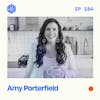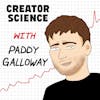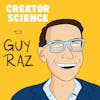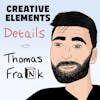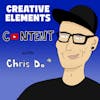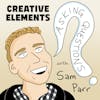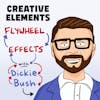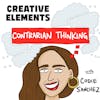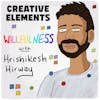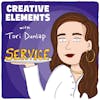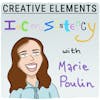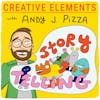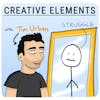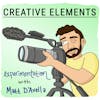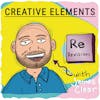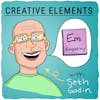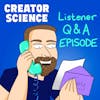
A special Q&A episode with Jay answering listener questions from The Lab, Twitter, and LinkedIn.
EPISODE DESCRIPTION
We're gonna do something a little bit different this week. In this episode, we're gonna slow down. We're gonna make this a little bit more casual, a little bit more of a hangout between me and you.
Instead of doing a guest interview as I typically do, I'm going to do a question and answer episode.
I'm going start with the questions that I got from members of The Lab, then I'm going to transition to Twitter, and then finally LinkedIn. I'm going to answer as many questions as I can before I lose steam.
Full transcript and show notes
***
CONNECT
📬 Subscribe to Creator Science
🙏 Make a guest or mailbag request
📝 Check out our curated Playlists
***
SPONSORS
💼 View all sponsors and offers
***
SAY THANKS
💜 Leave a review on Apple Podcasts
Learn more about your ad choices. Visit megaphone.fm/adchoices
Jay Clouse [00:00:14]:
Hello, my friend. Welcome back to another episode of creator Science. We're gonna do something a little bit different this week. We're gonna slow down. We're gonna make this a little bit more casual. a little bit more of a hangout between me and you. Instead of doing a guest interview as I typically do, I'm going to do a question and answer episode. Now to be completely honest with you, part of our content calendar changed And this is what I'm going to do to fill the gap to give us another week to prepare our next video episode and make it the best it can absolutely be.
Jay Clouse [00:00:49]:
So I went to the lab. I went to social media, and I said, what questions do you have for me? What questions can I answer for you on your creator journey? Now I've been listening to the Tim Ferriss podcast for a really long time. one of my favorite podcasts and some of my favorite Tim Ferriss episodes are his q and a episodes. So I'm taking a page out of old Tim Tim's book and I'm gonna do a q and a right here on the show. I have not organized these questions in any particular order other than I'm going start with the questions that I got from members of the lab, then I'm gonna transition to Twitter and then finally LinkedIn. I'm gonna answer as many questions as I can before I lose steam I have no idea how long this episode will be. I imagine it'll be at least an hour, maybe a little bit more. But I think this could be really fun, and I I like to be as helpful as possible.
Jay Clouse [00:01:40]:
I like turning my content into more of a conversation between you and I. So if you did ask a question on Twitter or on LinkedIn or in the lab, you'll probably be hearing your question here shortly. So without further ado, let's dive in. The first question comes from Mick. He asked, if it made sense to build the lab, which is now at capacity of 200 members, why not build the lab too, and impact another 200 creators while repeating your secret sauce. Interesting question. People ask me a lot if and when I will increase the number of members that I allow in our membership community, the lab above 200, and I have no plans to. I have no plans to increase that.
Jay Clouse [00:02:21]:
But They see as I am well aware, I could be making more money if I increase the size of the community and allowed more people in. I think what a Mick is alluding to here is, okay. I see the the value. I see the point in having a limited size membership. You have this 1. It's full of 200. Why not just do it again, kinda rinse and repeat, do the same thing. And I could see how that could work, but really not interested in doing that.
Jay Clouse [00:02:48]:
I mean, part of the reason that I have a limit on how many members are in the lab in the first place is because I put a ton of time into that experience. And if I were going to double the number of members I'm supporting, even if it is across 2 communities. I'm still doubling the amount of work that I'm putting in. So it doesn't really make sense. It would make a lot more sense in my mind to expand the limit, but I don't really have interest in doing that. It would change the experience. It would require a lot more of my time. And if I've more and more time into the lab.
Jay Clouse [00:03:18]:
I won't have time to do things like this podcast or the YouTube channel or the newsletter, anything like that. The other reason not to have 2 communities like this is because no matter what you do, there's going to be some sort of, like, class system. There are gonna be people in the lab 1 versus the lab 2 who don't get to connect with each other, but would like to be in the same community with one another. it would just get really, really messy. So don't advise having 2 distinct instances of essentially the same product though it's a creative solution to get around this cap that I put on my my earnings. Julian in the lab asked Do you think a creator business is sellable or exitable? Usually, creator businesses are built on the creator's passion and interest and are grown with a creator's personality attached. A lot of the value is built up in the creator's brand, but sometimes interest change of passions get lost. Is there a path to exit for such creators, are there any successful exits in the creator economy you can think of? Really interesting question here.
Jay Clouse [00:04:18]:
I mean, as a creator, in my opinion, you need to embrace being a business owner. And if you're going to embrace being a business owner, I buy into the idea that you should start your business with the end in mind. You should think about, is there a world where I would want to exit this business? And there's a lot of there's a lot of ways exits can happen, but what Julian is alluding to here is if I build a brand behind Jay Klaus, the name, and as a content business. And I no longer want to run that. I can't really sell my name and face, especially in audio and video. to someone else and not be the person on camera. I think that is true. I have an essay that I wrote several months ago called which name? Because I get a question from creators a lot, which is which name should I create my business behind? Should I create behind my personal name or a brand name? In my opinion, I create things behind brand names or project names so that there is more long term optionality to do things like sell the business, exit the business, things like that.
Jay Clouse [00:05:24]:
So I think in this this world, Julian, I don't know that you can realistically have an expectation of a good sales outcome for a business that is highly attached to your name, but it was not attached to your name in particular. I do think that it's possible. Let's take creator science as an example. So creator science, that is the brand name. Yes. The emails come from me. Yes. I show up in the YouTube videos.
Jay Clouse [00:05:54]:
But the brand is creator science. So that gives me some optionality, some flexibility that if I saw Future wear, maybe I do wanna exit this brand one day. I would start building towards that now. I would basically start hiring writers. I would be hiring other types of talent In the business, people who can show up in audio, in video, or in writing, and start to get their names associated with the content a little bit. Because a very common thing is buying a business and then -- continuing to employ the employees that are part of that business, the writers, the talent, things like that. So I wanted to go down that route, I would probably start hiring and operating behind this brand. And I think you could make that work.
Jay Clouse [00:06:40]:
I mean, that's essentially what happened with the hustle or the milk road, these media brands that are operating behind a name who have labor and talent in the organization but that labor and talent typically goes with the assets that are sold to the acquiring company even if the founder is exiting. There was a follow-up to this question to Julia's question from Becky in the lab, and she says, how do you think about separating your creative endeavors from your personal brand while also infusing your personal brand into the businesses you're creating. Kind of a meta question. But, basically, how do you prevent yourself from creating a business that's so tied to your brand but continue to actually have the good parts of your brand fuel the growth of that business. Becky goes on to ask how important is it to have a personal website, like jclouse.com, and then the separate website of creator science.com. And how early do you need to do this? So I get this question a lot as well, and this is another reason why I tell people, I recommend creating behind a brand or project name As soon as you have conviction around what that name is. You know, if if you weren't sure yet what the brand or project will be named, Then I think you're safe operating behind your own name on your own personal website in the interim while you find the best name possible. Because there is a force multiplier, in my opinion, for having a really great brand or project name.
Jay Clouse [00:08:01]:
I've said it before. I'll say it again. there was a night and day difference in my business when I rebranded everything to creator science. That name was good. It's it just elicits an emotional response. People have an assumption about what that is, and it's aligned with the content. It was a good name, and it does a lot of work for me. If you don't know what that name is yet, you can operate behind your own name.
Jay Clouse [00:08:22]:
But I do think you should build towards having a separate project or brand name from yourself. And when you do that, then it just opens up the opportunity to have your own personal website around your name and the website for your project. This is the model that I really, really believe in. You can kinda think of it as, like, a hub and spoke model where you, the person, or the hub, and your projects are all spokes. And so my personal website will always be a real time look at who is Jay, what are Jay's interests, what is Jay working on. But my personal website will not be a singular billboard for one of those businesses, at least if there are multiple of them. I don't think it's important to have a separate personal website from your project website. If you were doubling down on making your project website like the thing that you're building, then I would really focus on that.
Jay Clouse [00:09:14]:
but your personal website is also nice. Because if you don't have a personal website, like, do you really exist? I don't know. I think there's I think there's something there. Like, people expect digitally native creators to have a website. So if they say, who's this person I keep finding? Who's this Jake Klaus? they wanna search for that and be able to find that I have a website and that looks legitimate. Again, it's not necessarily a priority, but it's something that is valuable. And there is a little bit of an SEO benefit here as well. If you have one website that has good domain authority, let's say that Well, I started jklaus.com before I had creator science.
Jay Clouse [00:09:51]:
So jklaus.com has existed since, like, 2013 or something. It's had a bunch of different backlinks over the last 10 years that give it a good domain authority with Google. And as I start new projects like creator science, I can then link to creator science from jclouse.com that passes along some of that link goodness. And it goes in reverse too. If creator science starts getting good domain ranking, which it has, it can link back to jklaus.com, and that passes back some good SEO juice as well. So it can feed each other pretty nicely. But, again, if you are just getting started, and you have a project name and you wanna be building that, I think just focus on that, and that is just fine in the immediate term. Daniela asks, how do you go about choosing what to learn next, and how do you go about that learning? I've never really been, like, a just in case learner.
Jay Clouse [00:10:42]:
Everything I learn is just in time. It's I have a problem. I need to solve it, or I'm trying to get some outcome. I don't know the solution. I learned things that help me overcome problems that I'm running into right now. If I had more boundaries and more chill, there would probably be Hobbies and things that I wanna do that I wanna learn. I mean, we're about to move into a new house, and so we're back to doing some DIY projects. My wife is teaching herself how to lymewash a fireplace.
Jay Clouse [00:11:13]:
And we do stuff like that when again, we have a problem. We have something that we're trying to do. We a solution that we need to find, then we learn that. And, typically, depending on what it is, If I have someone in my network that I believe has already solved that problem, I'll go to them first. Somebody who's already wrestled with this, probably done the research. I'll send them a text. or a voice memo or a call or an email and say, hey. I'm looking into doing this.
Jay Clouse [00:11:38]:
It seems like something you've done before. Can you talk to me about it? I I've been exploring conversations in the world of publishing because of this. I'm trying to learn a lot about publishing and my options and timelines and make a educated decision about if and when to start writing this book that's on my mind. And so I go to people who've already gone through that process, both traditional publishing, self publishing. I have conversations with people first who I think already done that research, and then they typically give me a short list of things to consider that helps me come to a solution. That's often like decision making. When it comes to learning, really, the only way I learn things is by doing it. Yucky just have to do it.
Jay Clouse [00:12:17]:
And if I get stuck, I will look for things on YouTube. I'll find breakdowns online. I'm I'm building a secret website project right now behind the scenes. I'm using Ghost. And the thing about Ghost as a CMS is that when you're making changes, you really have to go into the code base itself. And there are things that I don't know how to do in code. And and so I find myself often googling things and finding explanations on Stack Overflow and things like that. So short answer is I reach out to people who I think have already solved this problem.
Jay Clouse [00:12:49]:
followed by Googling or looking for a video on YouTube. Next, we have Rob, Rob's a new member. Hello, Rob. He asks, how do you balance creating and connecting. I find it easy to block out time to create pieces of content, but struggle to find a routine around outbound connection, like social media interaction, checking with people I know, etcetera. And to be honest, Rob, I struggle with this just as much as you do, it sounds like. This is something that I recognize as one of the biggest force multipliers you can do as a creator is actually to focus less on making stuff and more on building relationships, making friendships, meeting people. I've I've really tried to put in place some processes to get better at this, but I just haven't.
Jay Clouse [00:13:32]:
So now my my quick rule of thumb is if I'm thinking about somebody or I'm consuming their work and I appreciate it, I shoot them a note. I did this with my friend, Danny Miranda. Last night, I was listening to an interview he was doing with David Senra on his podcast. I was really impressed with how comfortable Danny was in the interviews. I sent my voice memo and said, hey, man. Listen to your podcast. Just wanna let you know that I appreciate this. Those little check ins, I think, probably go a long way in relationships and reminding people that you exist and also letting them know that your door is open and you're thinking about them and you're rooting for them.
Jay Clouse [00:14:06]:
I know some friends of mine will set, like, a recurring calendar event every week, and they will make a list in that calendar event of a few people to reach out to. So you can system systematize this a little bit better. You can do things like on Twitter. There's a an extension called black magic that I set up and try to use, but don't use a whole lot, where you can mark certain users on Twitter as your favorites. And then That is a really quick interface for you to interact with their content, support them. I just think, you know, It really comes down to setting aside a little bit of time, putting it on the calendar. And if you wanna plan ahead of time, who you're gonna reach out to in that time, that probably helps as well. But honestly, this is something I struggle with and something I recognize as one of the biggest highest impact things I could do to have more success as a creator.
Jay Clouse [00:14:57]:
is actually do more outbound connection as Rob is saying here. Now we have a juicy question here from Daphne. Daphne asked What are the signs it's time to end a podcast, even a popular one, and how to go about doing it? Oh, Well, you know, I think signs to quit any project would be if you're not enjoying it. And I I say quit, But if you're not enjoying it, that's a sign to change what you're doing. Maybe it's quit. Maybe you quit doing the thing. Maybe you shut it down. But in a lot of cases, I think we underestimate the value that we created in the thing that we now want to quit.
Jay Clouse [00:15:35]:
There are sellable assets here that are inherent. You know? If you truly were tired of doing a podcast, the question is, are you tired of doing this podcast? Are you tired of doing podcasts entirely? And if you're tired of just doing this podcast, maybe you refresh it by changing the format or taking a break. You know? It's a it's a huge asset to have an audience of listeners on a podcast because it's hard to build that. So that's something that I would not let go of easily. Now that's me taking the approach of if this is a popular podcast how I'd think about it. If you I mean, I think the answer stands. The real answer is do you enjoy doing it? If you don't enjoy doing it, then it's time to make a change. That is the sign.
Jay Clouse [00:16:18]:
The change could be quitting it. The change could be changing it. the the change could be selling it, bringing in a cohost. You know? I think the ultimate sign is just that you've lost interest. How would I go about doing that? How would I go about quitting if that is truly the path that I was taking? I would probably think through okay. This is an asset that's valuable. If I am done with audio, if I'm just sick of doing podcasts, but I have this audio audience. What I really wanna do is get a sense for who those people are and try to capture some other way to communicate with them ongoing.
Jay Clouse [00:16:55]:
to say, hey. I'm glad you enjoyed the show. My journey in podcasting is over, but I'm gonna continue doing act you know, maybe that's YouTube videos. Maybe that's writing a newsletter. Maybe that's just being on Instagram and say, if you wanna continue connecting with me and learning from me, this is where you can do it. give them very specific direction for where they can connect with you, put it in the show notes. I might even, like, do a multi part series about that. You know, put that episode out.
Jay Clouse [00:17:26]:
Wait a couple weeks. Put another episode out and be like, hey. Yeah. In case you missed it, I am taking a break from podcasting, and this is where you can connect with me. There's some other implications. Like, if this is a popular show and there are advertisements that have been sold, You might wanna plan a ramp down of that. You've probably already committed to placing a certain amount of ads in your show and delivering a certain number of impressions. So if you don't want to shut down or go into breach of those contracts, then you probably have to plan on, okay.
Jay Clouse [00:17:56]:
How long do I have to put more episodes out to fill those sponsor obligations. Let's stop taking new sponsor obligations. And then at the end of that delivery, make your announcement to the feed. We're gonna take a quick break for our sponsors, but we have a lot of questions still to come, including the number one thing that led to growth in my email list and the one thing that I would do if I were starting over. so don't go anywhere. We'll be right back. Okay. We are back to the special question and answer episode of creator science.
Jay Clouse [00:18:24]:
Christina from Media Maven wants to know. Actually, she's got 5 questions here, which I will I will humor you, Christina, but I feel like this is cheating a little bit. Question one is, what one thing led to the biggest growth of your email list? That has actually just been the recommendations feature of the ConvertKit creator network. That is absolutely true. It has become the number one list growth tool in my stack, and it's not even close. Next, Christina asked, if you could do it all over from the beginning, what one thing would you change? So to be completely honest with you guys, I didn't know what I wanted to be a creator of. Okay? This is a common story. I see it happening around me all of the time.
Jay Clouse [00:19:07]:
which is people get enamored with the creator lifestyle as I did. And they don't think through what is my unique hook What is my unique premise? What unique value do I bring to this world? What is my point of view? And they just start sharing stuff. about the growth that they're doing. So that's how we end up with meta creators like me and a whole lot of others. So knowing what I know now, What I would go back and do is think about how do I wanna be regarded 3 to 5 years from now? What is the type of content creator that I wanna be? Who do I wanna serve, what I wanna help those people do. Even if I don't have the earned insight right now to position myself as an expert, I can set sail on a journey to become an expert over the next 3 to 5 years and say, hey. I'm gonna become a student of this thing. And if you follow along my journey, I'll share everything that I'm learning along the way.
Jay Clouse [00:20:00]:
And after a few years, you become a subject matter expert in that field. What I did was just say, like, I love this idea of being a creator and just study, study, study, interview a bunch of creators. And suddenly, the thing that I understand the best is how to build a creator business. And that's not uncommon. There are a lot of people who kind of get into things that way. I'm I'm lucky that I've broken through and had more success and a lot of folks who fall into a similar trap. So, really, what I would do if I was starting over was spend more time in the ideation phase to figure out what is the premise that I have as a creator? What is my hook? What is my point of view? And who is my audience? Who am I trying to help? And what am I trying to help him do? think a lot of people gloss over that premise part of their journey and end up not really knowing who they're serving and what they're gonna try to help those people do. Alright.
Jay Clouse [00:20:51]:
One last question from Christina. Sorry. I'm not gonna answer all 5, Christina. But her third question is, share the biggest mistake you made in your business and what you do instead. And I think the biggest mistake I made was that I didn't take discovery platforms as seriously as I should have, as quickly as I should have. I really got bought into the idea that email is everything. Email is an asset that you own. And so I went really hard at email for a really long time, and then I went really hard at podcasting.
Jay Clouse [00:21:22]:
And both of those are what I now classify as a relationship platform. and not discovery platforms. Relationship platforms are great for building deeper trusting relationships with your audience, but how do you get people into your world in the first place? How do they discover you? When you're focusing only on relationship platforms, you're really relying on word-of-mouth, and that is a slow form of getting in front of people. So I, not only, slowed down the growth I could have had if I was putting more time into social media, like, Twitter or on LinkedIn or even Instagram or YouTube. But it would have been a little bit easier for me if I had started on those platforms a couple years ago also. because things are getting more competitive. They are getting more saturated. I think anyone telling you that they're not is misleading you.
Jay Clouse [00:22:10]:
That's not to say that you can't break through, that can't find a success in doing it, but it is to say that you have to really button up your fundamentals, understand the premise again of what you're trying to do so you can stand out for the people you're trying to get in front of. So I wish I would have taken Discovery platforms more seriously earlier on. Andrea in the lab asks what's a common belief in the creator industry that you don't agree with? Alright. I'll give you a spicy take here. A lot of people in my position who are educating other creators, we are incentivized to convince as many people as to give it a shot because, typically, our products and services are things that help you give it a shot. So we're incentivized to try to sell more products. I honestly don't have any interest in convincing people to become a creator because I don't think most people are cut out for it. If you're listening to the show, you are almost certainly an exception.
Jay Clouse [00:23:08]:
If you're listening to the show, you're investing time to better yourself, to learn how to do this journey, you are probably cut out for it. But most people aren't. Creators in my mind, at least to make a living at this to be a professional creator, You have to be a business owner. And I would go as far to say, you have to be an entrepreneur. And entrepreneurship is hard. It's a small number of people who are built for the pain that is entrepreneurship. And so I don't give into those pressures to convince people to become creators because I think that would cause a lot of people who are not willing to endure that pain. to endorse some amount of it.
Jay Clouse [00:23:48]:
I just don't even know if the math works out. Let's say that everyone wanted to be a creator. Yes. We will see unbundling of giant media conglomerations so that we aren't putting so much of the human attention into a few massive megaphones. There is a world I could see where we all choose to get our information from small micro influencers, micro media companies, And so there's there's space for a lot of people to be creating. However, like, I don't know if that's actually how things would go. Like, if if if half the population became creators, Is there enough attention that would be evenly distributed to support all of those people being creators from the people who are not? And I guess you could say, well, the creators themselves are also consumers. So there's something there.
Jay Clouse [00:24:41]:
But, anyway, I see a lot of people saying, like, Soon, everyone will be a creator. Everyone will be doing the content creation thing, and and no one will have a job. And I don't think most people are interested or built for it. And also, I don't know what the math works out that everyone can be a creator. I think this is going to continue to be a a specialized career. I'm excited about it. It's something that I wanted to devote the rest of my life to doing and the people who choose that they wanna go on this journey. I wanna help them to do so, but I don't think it's something that we can expect most people to do and be successful at.
Jay Clouse [00:25:17]:
Alright. Well, those are the questions from members of the lab. Thank you guys for leaning in, sharing some questions that we could put on the show. gonna transition now over to Twitter and some of the questions that I got there. Sashid asked if someone bought your business tomorrow, what 20% would they keep and what would they get rid of? This is a hard question because my question is, like, 20%, what do you mean? 20% of what requires effort on an ongoing basis, 20% of what incurs incurs costs 20% of the assets. I mean, I think the most valuable 20% is The email list, which is about 30,000 subscribers, the channels that I operate in generally because there is the asset of trust from the audience. However, if people bought that from me, could they do that without my name, not the social media channels. They could probably do the emails, the website.
Jay Clouse [00:26:11]:
You could probably pull a new talent to the YouTube channel but it's probably it's probably the email list. because even the lab, the lab is the most valuable part of the business to me. And would people stick around and continue to renew if it wasn't me that's in there? I don't know. So I think I think the asset that is most valuable is the email list, and the website, both for the intellectual property that's on the website and the associated websites like the courses, But, also, the domain authority of the website, it's it's a pretty strong domain. And so there's value there as well. A slight spin on that question. This is from my friend Kat Mulvehill. She's in the lab.
Jay Clouse [00:26:54]:
She brought up a question that I believe is originally credited to Andy Grove. And the idea is I'm paraphrasing. If you hired a replacement for yourself tomorrow to come in as CEO of your company, What are the first decisions that they would make? What are the things that they would change? And I love that question. It is so clarifying. It brings so much to the forefront of what you should be doing and what you're avoiding. Periodically, I just go back to that question, ask myself what would my my replacement do? It it highlights the obvious Things I know should be done that are not yet done that are the most high impact. And every time I I ask that question, it quickly becomes my prioritized to do list. Okay.
Jay Clouse [00:27:36]:
These are the things. These are the projects, the steps that I really need to take. Hozaline asks, what keeps you motivated especially once your financial goals have been accomplished? How far in advance do you plan and set goals for? what elements of your success journey have been the most surprising. So three questions in one. I'll go in order. What keeps you motivated once your financial goals have been accomplished? had a conversation with my coach years ago. When I first started the business, I had, in my second year, earned something like, I think, $60,000 or something. thing.
Jay Clouse [00:28:08]:
And I set sail for a new goal, which was 6 figures. A $100,000 is a nice round number. It seems like something that if I accomplished it as an individual creator, that would be impressive. And early on, it was very obvious that I am not tracking on that number. Like, I am not on pace to hit 6 figures. And there was no reason why. I just couldn't motivate myself to work harder. And I talked to my coach about this, and he said, listen.
Jay Clouse [00:28:39]:
You aren't motivated by money. And so you will work harder when your vision outpaces your resources. And right now, you don't have a vision for what you're trying to accomplish. the resources you have can more than sustain what you're doing. And so once you really tap into an span and understand your vision for what you're trying to build, then you will require more resources to achieve it. And that is what will push you to work harder once your financial goals have been accomplished or helps you set a new financial goal. And that was 100% true. you know, as as the business has done better, you know, month over month, I'm earning somewhere between $40,050,000 top line in the business.
Jay Clouse [00:29:22]:
But month over month, I'm also increasing the investments I'm making into the business, whether it's a new team member or a new function or a new tool. that I'm investing in, or have you been invested in things like legal and accounting over the last year to do things at a higher level? as my vision for what I'm trying to do with this business and I look at creator science. And to me, the realized version of this business is 2 things. somebody, no matter what part of the creator journey they're on, they can enter into the creator scientist science universe. They can be assessed and then put onto a personalized path to get them to the outcome which is becoming a professional creator. And on an ongoing basis, we should be producing timely relevant tactical content. for different parts of the creator stack as well. So there's a whole lot of production of content that needs to happen.
Jay Clouse [00:30:18]:
for that realized version of the business to happen. And so not only does that come with cost of hiring people, but I continue to need to support myself, my wife, the family we're building. We're moving into a bigger house so our mortgage is going up. So, you know, the vision of what my life can and will be in the next few years, it expands, which means that the resources required to achieve it expand as well. of course, there's a counterargument here, which is to just say, like, no. I know what enough is, and my vision is attainable within a short period of time. My vision is just enough and and happiness, but I do believe that there is a fundamental truth in that if your business is not growing, it is declining. Some people say dying, but it's very unlikely that you're going to on the dot hit the same amount of revenue year over year.
Jay Clouse [00:31:13]:
So after a 3 year period, when you can see a trend line, is it going up or down? And if you declare enough, you're probably gonna start to go down. And I wanna continue to grow the business, provide for my family, provide for other people on the team, build the full eyes re fully realized version of this thing, and that's what pushes me. motivates me every day. Joseline's second question there was how far in advance do you plan and set goals for? I set goals on a monthly basis. This is something I share in the lab in my monthly retro I do set something like almost 10 goals every month in 4 different categories. And as 10 goals total across 4 different categories, which are revenue, strategy, personal life, and audience building. So I set goals every month, and I also set goals on an annual basis. So my monthly goal should stack up and get me towards my annual goals.
Jay Clouse [00:32:09]:
What I haven't really thought about is multi annual goals. which I probably should. But I haven't really been able to wrap my arms around what, like, a 2 year or a 3 year or a 4 year or even a 5 year goal looks like. But I can do annual, and I can do monthly. I don't really go deeper into that into, like, weekly, but you could. I'm mostly a monthly and annual guy. Alright. Last question here from Joseline.
Jay Clouse [00:32:33]:
He asked, what elements of your success journey have been the most surprising? And, man, I don't even think of my journey as a success journey most of the time. You know, when I look back at where I was 3 years ago, It is crazy how far I have come, how far the business has come, and a lot of different measures. But it doesn't it never feels crazy in the moment. You know? Like, everything changes so slowly. It's kinda like It's kinda like when you get a haircut. When you get a haircut, it's clear that you have this neat trim haircut. And then Every day, you see yourself in the mirror, and the changes on a daily basis are very, very slight. But then after a few weeks after you know, a month, you realize, I need another haircut.
Jay Clouse [00:33:22]:
And you get it, and it's very clear, very quickly how just how much growth there has been once you really cut down into it. I guess what I'm trying to say is, when progress is happening constantly, in a small almost indiscernible amount is hard to sit back and reflect and be like, wow. I've really been successful or or things have really changed because they changed so slowly that it doesn't feel like big things are happening. The the most surprising aspects of my journey is You know, I've I've been doing more speaking gigs lately. And I go to CX, or I go to Kraft And Commerce in Boise, and people come up to me and they listen to the podcast. They read the newsletter. They know me, and I don't know them. And that's crazy for, like, the longest time.
Jay Clouse [00:34:14]:
It felt like I knew everybody that was tuning in to my stuff, reading my writing or listening to the podcast. But now that number has just gotten so much higher than the number of people that I hear from on a consistent basis that it's it's almost jarring to meet people who know your work, and you don't you don't know them. But that's that's what we're trying to do. We're trying to impact as many people as possible. I'm so grateful for it. And it's it's surreal and it fills me with pride when it happens. But you know, I I don't even really feel like I've changed over the last few years. I know that's completely false.
Jay Clouse [00:34:49]:
If I look at myself today and then I say, okay. Let me look into a version of Jay 3 or 4 years ago, I can see the differences then. But, again, it's it's been so slow and indiscernible that it really doesn't feel like it. Dennis asks at what point does it make sense to add a VA? VA meaning virtual assistant, I believe. And I responded to Dennis, and I said years ago. Here's the thing. If you can find a good VA, if you can find a good assistant, the sooner you hire them, the better. I have an episode of the show coming out soon as an interview with Bonnie Christine.
Jay Clouse [00:35:22]:
She's a pattern designer, but I heard her talk at ConvertKit's Craft And Commerce. conference, and her talk was all about hiring and delegation. And she introduced me to this concept of a Freedom figure. A Freedom figure is if you take your total annual revenue and divide that by your working hours, that is your effective hourly rate. So if we take a conservative number of 500,000, which is what the business will earn this year, divide it by 2 1080, which is the number of hours if you work 40 hour workweek. My effective hourly rate is $240. So the idea is If you are doing a task that you could outsource for less than $240 per hour, whatever your Freedom figure is, you should outsource it immediately. Get it off your plate to redirect your time towards things that have a higher impact on a business and allows you to generate more income in the business.
Jay Clouse [00:36:20]:
Now there's, like, a certain amount of belief that has to come in there. Right? Because I'm not going to hire a VA and then turn around and do hourly coaching and just earn money to that degree on every hour. I'm gonna be creating assets. I'm gonna be creating content, things that have more leveraged long term value, but are also very spiky in nature. You know? I just released my my latest course. It's a mini course. It's called the newsletter Masterclass. It's a $49 product.
Jay Clouse [00:36:52]:
It was 2 hour live session that's now recorded that you can watch the full 2 hour live session. And that mini course had over 200 people enroll before we actually did the live version, which was a result of more than $10,000 from that course. And that was spiky. You know? But that's the type of thing I can do if I have more time in outsource, some of the rutinized, repeatable, low impact work that I'm doing right now. So I really wish I woulda hired sooner. I have an assistant now. Her name is Izzy. She's doing great.
Jay Clouse [00:37:30]:
And, really, the biggest thing that I need to do is get out of her way and empower her to do more things. so that I can really focus on the two things that I think are most important, and that is creating creative assets and building relationships to Rob's question earlier. Alright. Next, Eric asks, when is the ideal and that's in quotes. When is the ideal, quote unquote, ideal time to drop client work and go all in on being a creator. Love this question and going to get right into it after one more quick break for our sponsors. Back again with some more questions. Back to Eric's question of when is the ideal time to drop client work and go all in on being a creator.
Jay Clouse [00:38:11]:
So I am not somebody who recommends people just take a leap without a plan or without a parachute or without knowing that they can backfill the income that they were having from client work. Actually, more often, I recommend that people who are doing client work but wanna be a creator but are struggling to time. I actually recommend finding a part time job because here's the thing. Employment, we have this binary view of you are either in employed or you are not employed. But, really, even full time employment is just a sale of your time for some compensation. And then in a full time sense, we're often trading that not only for salary, but for benefits. But the thing is the nice thing about employment is you're also setting really hard boundaries a lot of times of when you're working and when you're not. And when you're doing client work for yourself, we often let those boundaries erode away.
Jay Clouse [00:39:09]:
So a lot of people doing full time client work find themselves working more hours than they were in a job, sometimes earning less money. And now they have fewer hours outside of client work to actually do the creator thing. So having a job is actually really nice even though it's part time. Really nice to give you some clear boundaries. Take care of the financial question for you and then give you back some time to do the creator thing. In any case, what I recommend people do is think about their income as, like, a 2 bar vertical bar chart. Okay? And it's proportional. So it starts with a 100% of your income comes from client work or your job, and 0% is from being a creator.
Jay Clouse [00:39:51]:
Over time, you wanna grow that creator bar so that it's starting to eat into the total amount of income that you're receiving. Let's say a $100,000 is what you're earning. in a job, and you have $0 coming from the creator work. If you can get to $10,000 in the creator work, now you're starting to shift the proportion of how much you're earning from your creator stuff versus your job or client work. And what I encourage people to do is get that to, like, a 5050 or maybe even 4060 where half or the majority of your income is coming from the creator work and then go all in on being a creator. Takes a lot of discipline in the small pockets of time you have available to get there, but it also takes some time to really turn on meaningful revenue as a creator. Like, It's it's tied in a lot of ways to the size of your audience, the length of time you've been sharing with them and building trust with them. You can't really just, like, force this.
Jay Clouse [00:40:49]:
You can't create trust in a short amount of time. People don't buy if they don't trust you. And you can't just wave a magic wand and have trust happen. Trust happens with a lot of time and a lot of you following through and being the person people expect you to be. Time just is necessary. So I really don't recommend going all in on being a creator until you're already generating significant revenue as a creator. Next, we have David Spinks coming in with a intense question. He says cut, double down, delegate.
Jay Clouse [00:41:21]:
If you were to force to make a choice, Number 1, what part of your business would you cut? Number 2, what part would you 2 x effort on? And number 3, what part would you delegate or outsource? So what part of my business would I cut? If I was making a pure business decision, it would probably be the YouTube channel. because it's not turning an ROI yet, and it's a lot of work and it's also the highest expense in the business. So just on paper, it doesn't make a lot of sense right now if you look at the p and l and say you're putting how much into YouTube and you're earning how much from it, but it's an investment. I look at it as an investment that's gonna take multiple years. And, you know, I think 2 years from now, 3 years from now, maybe even a year from now. I look at it as, man, I'm so glad I made that investment. But right now, if I were forced to make a choice. That is probably what I would cut.
Jay Clouse [00:42:15]:
It would free up a lot of cash. It would free up my own time and space in my brain a little bit. But thankfully, I'm not forced to make that choice, and I have no plans to cut the YouTube channel right now. 2nd was what part would you 2 x effort on What would I double effort on? I actually low key feel like doubling effort on the podcast is what could have the biggest impact. But Doubling effort on the podcast doesn't look like recording twice as many episodes. It doesn't look like making production twice as good. it would be increasing the amount of effort I'm putting into growing the show. which, like, that sounds like a obvious thing.
Jay Clouse [00:42:57]:
Like, oh, if you can grow the show, just go go do it. But growing a podcast is really hard. The way that you grow a podcast is getting it in front of podcast listeners, which means that you've gotta be doing cross promotions or being a guest on other shows or advertising on other shows, Those processes are not only difficult and competitive, but they're time consuming and expensive. It's just tough. So a lot of times, that is where I don't put as much focus as I probably should just because it's hard to put that effort in, but that's why there's still opportunity there. I believe that podcasts are the hardest platform to grow an audio only podcast that is. I also believe that podcast businesses are probably some of the strongest and most compelling businesses in the creator landscape. But it's it's tough to get listeners.
Jay Clouse [00:43:46]:
It's tough to get people to pay attention. 3rd, he asked, what part would you delegate or outsource? I'm doing this a lot now, and, really, the answer is anything that is not creating creative assets, or building relationships with other people. Everything else should be outsourced. My good friend, Roberto Blake, ask What are 3 best tips for growing a subscription based business? And I think it's alluding to the fact that the lab is a membership business. Let's see. 3 tips. Number 1, I think it has to be very clear what your premise of the product is. What are we doing here? What's the point of having this membership? What is our shared goal? With the lab, this has actually gotten more crystallized over time.
Jay Clouse [00:44:27]:
But the premise of the lab is this is a place where professional creators experiment and share the results of those experiments together. That is the north star because that is what makes this compelling as a recurring subscription. That is what makes it differentiated in terms of the information that you can find. And that is what excites me about the vision of the thing, which encourages me to put more time into it. So number 1, the premise of the product. Number 2, I am a big, big fan of not having monthly options in your pricing. If you are doing a membership that is predicated on peer to peer interaction. Because in a membership where the the value is coming from your relationships to other members, What you don't wanna have is constant churn.
Jay Clouse [00:45:13]:
That makes everything just kind of chaotic. You know? If you have friends that you're making, that you're meeting, who are just coming in and out every month or so. It's hard to build enduring relationships. But the great thing about the lab being an annual only membership When somebody's in there, they're in there for 12 months. There's a lot of time for you to go get to know them, to learn about them, to see their content, It's awesome. From a business standpoint, it's also, I think, a lot easier to make the case for one buying decision versus 12 consecutive. It's really hard to get somebody to renew twelve times in a row to have a whole year with you And it can have nothing to do with your product or experience. It can be have have everything to do with some weird circumstance in their life that happened, and they're just trying to cut subscription costs.
Jay Clouse [00:46:00]:
So I like having annual only or I should say just like less frequent billing than monthly. And third, I think that, you know, you need to make your subscription products be their favorite. for that thing you're trying to do for your premise. Because I think people are going to not only get tired of subscriptions, But I think they're gonna get stretched in terms of how many communities they can be active participants, and and people are going to retract or, you know, kinda fall back into 1 or 2 communities that they feel really close to. So how can you build the one space that if people were to cut everything else but one, that is the one they would keep. KP asks, who are your 3 dream guests? And have you pitched them yet? I feel attacked. Well, I know 2 of them would be Bo Burnham and Lil Dickey. And I have tried to pitch Lil Dickey in the past by playing around and finding what is I know one of his existing Gmail accounts, but maybe not one he checks.
Jay Clouse [00:47:10]:
Have not heard from from our friend, Dave Byrd. I have not pitched Bo Burnham. I have no idea how it'd go about pitching Bo Burnham. I'm also afraid to pitch Bo Burnham. And the 3rd No one is immediately coming to mind. You know, it's interesting. I'm gonna take a little bit of a tangent here about how I'm thinking about podcasting generally. But What I'm personally more interested in lately is instead of kinda clout chasing and picking big names because I think big names is what makes people listen to podcasts I'm actually more interested in following my curiosity in specific subjects, finding somebody good to talk on that and really focusing the aperture of that conversation on one specific idea.
Jay Clouse [00:47:54]:
Because then that episode is an asset in my library, in my body of work, that has a specific purpose that it serves. Podcasting back catalogs don't get a lot of play. And for a long time, my interviews were very, like, profilely, like a a profile of the guest, and we tried to cover a lot of ground. I don't know how interesting that is over time. It's an interesting snapshot. But I think more interesting is, like, my recent conversations with people like Patty Galloway, where that episode, it was a tight 30 minutes. or so, and we really focused on what does the preproduction process look like. I think that's going to be so referenceable over time, get so much value out of that.
Jay Clouse [00:48:36]:
I'm more interested in having conversations like that. I'm also interested in having a small number of repeat guests who come on the show fairly frequently. You've already seen Justin Moore's come on the show a couple extra times, Jay Hunzo. What I realized in the podcasting space is co hosted shows do really well. And I think it's because the rapport of the cohost makes for a very pleasing listening experience where you feel like a friend in the room as well. So if I'm interviewing guests who I've never met before and never had a conversation with, we don't have much rapport. It's hard to get to that same listen ability, whereas if I have some repeating guests, then not only do I have rapport with them, but you are starting to feel like you have rapport with them, And that's where I'm heading with the show, is very specific episodes as well as more repeating guests. Phillip says, I'm fascinated to know about your decision to make your episodes highly edited.
Jay Clouse [00:49:34]:
Your commentary cutting out of questions. Do you script it mostly beforehand, or do you see where the conversation goes and make it more of a story in the edit and why. So the only thing I script in the show is the intro sometimes. even the the mid rolls where I go into and out of ad breaks, that used to be scripted, and that's a little bit more free free flowing now. So it's not scripted. I think it is a skill to develop to interview people, and you start to construct a story arc or a question arc of what you wanna know And think of it as you want to get more intense as the interview goes, but then you also wanna wind down. So it's it's literally like a bell curve where you start kind of not intend to get more intense over time as you earn it and you build rapport, and then you cut it down. We produce things heavily because I think we are living in a time when content is more and more commoditized.
Jay Clouse [00:50:26]:
It's easy to make content so a lot more people are doing it. But I think that high quality stuff will really stand out. Like, I wanna build a reputation on the quality of my work and the the premise of this question shows that it's working in a way. So I think that's worthwhile. I think it especially helped in the early times as well because The hardest thing to do when you start a podcast is get people to click play for the first time. And if they click play, most people will stop listening very shortly after that because most people podcasts are really bad. So when we started with a high production show, it was better than people expected, so they kept listening. And I think it helped get the show off the ground.
Jay Clouse [00:51:08]:
So I think it's a good strategy to start with is to aim high, you know, I I think, especially in audio, you really wanna come out of the gate strong because I'm blown away at how popular the first two episodes of shows still are because people hear about it and they go all the way back. It's crazy, but they do. Ginny asks, at what point does one diversify platforms and Split energy? The typical answer is to build a 100,000 person audience and tackle another platform. What's the tipping point? Well, I I think that you should resist diversifying for as long as possible. I think one of the biggest mistakes that I made is that I decided to go on, like, all the platforms. I'm on all the things. I'm writing a newsletter. I start a podcast, then I start saying, oh, I need your Discovery platforms.
Jay Clouse [00:51:56]:
Let me do Twitter. oh, I can move Twitter over to LinkedIn. Let me do that. Guess I'm gonna be on YouTube now, and now I'm starting to pay attention on Instagram too. So I'm doing too many things. And there's a huge, huge cost to that. The story I tell myself is that I have to do that because I'm serving people on all those platforms. And if I don't have a working knowledge of it, then I can't be helpful.
Jay Clouse [00:52:17]:
Maybe that's true. Maybe that's a story I tell myself to prevent myself from making a hard decision dropping some of these. But the people who grow the fastest across multiple platforms, the pattern is they build a large audience on 1, and they leverage that to go to someone else who has a large audience on the platform they want to take on next and say, hey. If you help me grow over here, I'll help you grow over there. And you do that, repeat, repeat, repeat on these different platforms. And very quickly, you can have success on one platform be leveraged to become success on other platforms. So I would really resist diversifying as long as you can, Ginny, because As you go into more platforms, not only do you have to get good at the game that is that platform, meaning you have to understand what content works here, What is the culture like? What is what is the formatting of this platform like? But they're games within the games too. Because even if you're good the content.
Jay Clouse [00:53:13]:
You need to understand who are the other players in the game? How do I play with them? How do I play nicely with them? How do I get them to like me and to support my content as well? And if you explode that effort across multiple platforms, it becomes overwhelming. It is so much work. So I wouldn't. Like, I I just would really focus on doing one platform really, really well until you feel like you've hit a plateau I don't mean a plateau as in I'm not growing, and I don't know why, but a plateau of, like, I think I've kinda saturated this platform's reach for my type of people. So resist resist the energy as much as you can. I think it's good to have one relationship platform. So, like, email, is what I recommend most or podcasting and one discovery platform and just grow that discovery platform like crazy, try to move people from that space into email, and you can build 1 heck of business just with those 2 platforms. Alright.
Jay Clouse [00:54:12]:
I'm running out of steam a little bit, and I need to go mow the yard soon. take just a couple more of these. Jane asks, what's your biggest challenge now as a creator? Barrowing this from Kitus, how do you define success for yourself at this point? So two questions there. What's my biggest challenge now as a creator? It's time allocation. Everything comes down to time allocation. Where am I investing? My limited amount of time and not even just time? but creative energy because, you know, you probably get a couple good hours of high quality creative energy a day. Where am I putting that? And where am I putting even my less creative energy throughout the day? Time allocation is everything. Everything.
Jay Clouse [00:54:53]:
Everything. Because Eff compounds. And so if I put time towards the right things today, that decision will compound and benefit me in a huge way down the road. And conversely, like, there's an opportunity cost to everything. So the things that I'm not doing right now, I am foregoing a compounding huge impact. So time allocation is just everything, Jane. Time and energy allocation is the hardest thing. How do I define success for myself at this point? It's waking up in the morning and feeling excited to get out of bed and start the day.
Jay Clouse [00:55:28]:
It's feeling like The business is supporting me and my family while also delivering great outcomes to the people who are interacting with it. That's pretty much it. I wanna enjoy my time. I wanna be excited to wake up in the morning. I wanna feel supported financially for what my family needs, and I wanna know that making an impact on the people. who are choosing to tune in. Ilsa asks, how do you decide whom to say yes to if somebody asks you to join their podcast? This is getting challenging, to be honest. because for the longest time, I just wanted to say yes to everybody.
Jay Clouse [00:55:59]:
I love going on podcasts. But what has come to light is that time allocation is everything. And when I say yes to a podcast, I'm saying no to other things that I could be doing that could put in motion fundamental changes in the business in a compounding way over time. So I've gotten a lot more picky on this. And the honest short answer is I go on podcasts and channels that I believe have people listening and watching them. Because the the point of going on these channels on these shows, mostly, is to get in front of new audience. And if there's not an audience on the other side of this, then it's not really a great use of my time. And so I'll use some quick and dirty, not necessarily good or perfect measures of this.
Jay Clouse [00:56:51]:
I'll I'll look and see how long has this thing existed? Is it reasonable to believe that they'll continue doing it. I look at the number of ratings on Apple Podcasts to give a approximation of our people listening to When's the last rating? Are people listening to this right now? I get the same on Spotify. YouTube's a little bit easier because you can look at their channel and see the engagement on each of their videos. If it feels like there's not really an audience there, I won't necessarily say no all the time. It also comes down to who the person is, how they've approached the ask. I do like to give back to folks who have supported me in my work. So I will typically say yes to people whose names I recognize is someone who has supported me in the the podcast or the newsletter or something in the past. But, typically, I'm looking for, if I spend time to go on this podcast, will people hear it? And are they my people? Does it even make sense? I'm gonna take a couple of questions here from LinkedIn, and then we'll wrap this up.
Jay Clouse [00:57:48]:
Blair asked several great questions. Thank you, Blair. I'll focus on the last couple. One, she says, I'm considering moving my newsletter to convert kit. I know you're a fan, and I heard on your episode with Nathan Barry that the goal is for creators to get paid. So the cost of ConvertKit isn't an issue. How can I get there as a newsletter newbie about 400 subscribers? Well, ConvertKit offers a free plan below a 1000 subscribers. There are some limitations to what the product can do under that limit, but there is the free plan option.
Jay Clouse [00:58:17]:
You know, when you're getting started, I think that the the best product progression as a creator is to start by providing a service. And if you know who your audience is and that you can provide a service for them, you start to see some patterns, and you can basically productize that service now to say, okay. This is the outcome of this productized service. This the process for it. It makes things a little bit more efficient if you're saying, like, hey. This is a five page website build out. And If you purchase it, here's the process for how we're gonna do it, here's the cost. It's consistent time over time.
Jay Clouse [00:58:52]:
Now that's not totally leveraged yet. What I like seeing after that or maybe even in lieu of that step is to say, okay. I see patterns now between what clients want from me. I'm gonna do some sort of live instruction. Maybe it's group coaching. Maybe it's doing a cohort based course where you can test your ideas and curriculum quickly. Also, you don't need as many sales for this to be meaningful in terms of revenue because people still value direct time and attention more than digital products. So people will pay more to take part in a live format, whether it's group coaching or a cohort based course.
Jay Clouse [00:59:31]:
You can test the curriculum. You can see what lands. You can see where the holes are. You can ask you can get asked questions in real time. You can improve the curriculum. You can intervene when people are not following through because you can see them and understand when things aren't landing. And then after you do a couple of processes of that, you take that group coaching product or that cohort based course, you turn that into a self paced digital product. And you build an email experience towards that product.
Jay Clouse [01:00:01]:
So I know that's a very quick explanation of how I think about things, but I think do them unscaled 1 to 1 first then one to several, then package that, produce it into a 1 to infinite type of product. Next, Blair asked, do you deal with impostor syndrome? If so, how do you deal? I used to. I feel it less than before. I think The thing about impostor syndrome is having it is a sign that you have some level of self awareness and empathy. there's there's a a psychological phenomenon called the Dunning Kruger effect that I write about a lot. And the gist of it is the less experience you have with something, the more likely you are to have overconfidence that you are good at it. And then as you get more experience with something, you very, very quickly lose confidence in your ability to do that. So, typically, if you have impostor syndrome, I think you are in that period of the growth cycle where you have realized just how much there is to this area, and you feel self conscious about your level of knowledge.
Jay Clouse [01:01:07]:
And that's actually a good thing because you're further along the growth spectrum than most people. So I remind myself of that. impostor syndrome is usually an indication that, actually, I am not an and it also goes away with evidence. The more evidence that you create that you are capable, you're competent, that what you do helps people it starts to go away a little bit. But, you know, sometimes it just escalates the types of rooms that you are in, the people that you're around, and Imposter syndrome comes right back. So it's hard to get rid of entirely. Alright. Last question here.
Jay Clouse [01:01:42]:
It comes from Hannah on LinkedIn. She says, I'd be interested to hear you're thinking about your Sunday newsletter content. I send Creative Science every Sunday. If you do not get creator science, go to creator science.com. Subscribe, you'll love it. Specifically, she says, I noticed that you don't include your whole essay in the newsletter, but instead drive readers to your website. Could you share a bit about the strategy behind this decision? Thanks for considering. So in that newsletter, most weeks, I'll write a new essay.
Jay Clouse [01:02:07]:
And, typically, that's like a 1500 to 5000 word piece. And on one hand, it was getting too long to even fit in the body of the email because I like to go into depth. I like to go into Nuance. I like to say as much as I wanna say, and that can be kind of long. So what I've started doing is I have a block in the newsletter itself that has the title of the essay. It has a short synopsis of the essay, and then a button to say, read more. Here's how long the essay is, and it goes to the dedicated page on my website. This has had a really good impact in on a lot of things.
Jay Clouse [01:02:43]:
For 1, it increased the click rate on my emails because people who open the newsletter, which is It has a subject line related to the to the title of the essay. They open the email. They're gonna wanna read the essay, at least a lot of them. So They click that link to go to the website. My click rate increases on the email. It's also increased the traffic to my website because the essay is on the website. Because the essay is on the website, it has a URL, which is a lot easier to share. So more people share it.
Jay Clouse [01:03:16]:
They might also comment. They might also leave a reaction to the essay. And by being on the website, it also gets them in front of some of my products offers that are on the website. And so sales of digital products that's increased. So there was a big benefit to having the strategy of making the newsletter itself shorter by having less of the essay in the body of the newsletter just kinda giving a trailer of it and then a link off to the website if they want to read the whole thing. Now way more people open the email, then click that link and read the essay. What's that mean? I don't know. There are other aspects of the newsletter besides the essay that people must find value in, including the links that I share and some of the editorial I do at the bottom of each issue.
Jay Clouse [01:04:01]:
So there's there's other things to find value in in the newsletter besides the essay, but having that strategy has been a big positive in my opinion. Alright, my friends. I am out of gas you for the questions. Thank you for the questions on Twitter and LinkedIn and in the lab. I would love to hear what you think about this format. If you enjoyed this, please tweet it me or find me on Instagram and let me know. I am at jklaus on both. It would mean a lot to hear from you.
Jay Clouse [01:04:28]:
I'm happy to do this type of format. If this is something you enjoy, I'd love to do it more often. I think it's fun. If you enjoy the show generally, please consider leaving a review on Apple Podcasts for Spotify it truly, truly, truly makes a difference in how we chart on the show, and we are getting close to the top of the Apple charts. So reviews on podcast right now would go a long way. Otherwise, thank you for listening, and I'll talk to you next week.
Most Popular Episodes
New to the show? Check out some of our most popular episodes.






